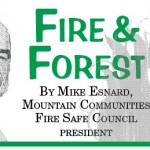The recently enacted $150 state fire protection fee will not be implemented for several months; nevertheless, it is already attracting considerable opposition that is starting to take shape in multiple forums — the voters, the Legislature and, eventually, the courts.
The first formal action was the submission of a proposed referendum to eliminate the fee. State Sen. Ted Gaines (R-Roseville) filed the referendum papers on July 15. Gaines has not yet specificed how signatures for the referendum will be collected, but he wants to see it on the November 2012 ballot.
The fee would apply to approximately 850,000 residential structures for which the state has fire protection responsibility. Estimated revenues are $50 million for the first year and $150 to $200 million in succeeding years. Hill communities, including Idyllwild, would be fall within the fee-paying State Responsibility Areas.
State Assemblyman Brian Nestande, respresentative for Idyllwild, was disappointed that the fee would apply to Idyllwild Fire Protection District (IFPD) residents. “Double taxation,” was his initial response.
Unfortunately, according to his chief of staff, Rob Flanagan, the current IFPD parcel or unit fee does not appear in the state’s records as a local tax because it is designated as an assessment, which is considered payment for a service. While the state recognizes the more than $1 million of property tax revenue for IFPD, the special assessment is viewed differently even though the IFPD makes no distinction in its use of the two different revenue sources.
Nevertheless, Nestande is planning to write the Legislative Analyst’s Office to ask how much revenue the state would lose if special districts, such as IFPD, were exempt from the new levy.
Armed with that information, he will work with Lake Elsinore Assemblyman Kevin Jefferies on finding a way to exclude special fire districts from the additional tax imposition.
Finally, Kris Vosburgh, executive director of the Howard Jarvis Taxpayers Association, said, “We will be filing a [law] suit.”
The suit will not come for months, since the courts require an injured party, i.e., someone who paid the fire protetion fee, to be the plaintiff. Once the State Forestry Board implements the tax payment process, the Jarvis group will find a taxpayer to represent.
Vosburgh also emphasized that one aspect of their suit will be the double taxation situation that exists in several special fire districts, such as Idyllwild. They are definitely prepared to go to court once the state collects the initial fees, Vosburgh said.










